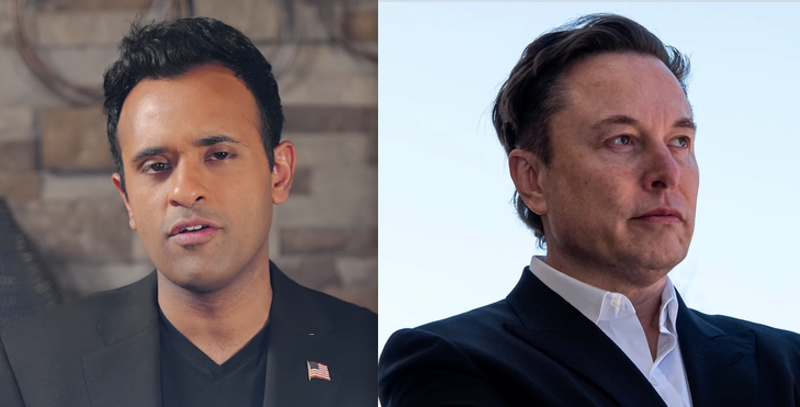President-elect Donald Trump picked Tesla CEO Elon Musk and businessman Vivek Ramaswamy to lead a newly created Department of Government Efficiency.
The department’s acronym, DOGE, is a nod to Musk’s favorite cryptocurrency, dogecoin. Trump said the new group will pave the way for his administration to “dismantle government bureaucracy, slash excess regulation, cut wasteful expenditures and restructure federal agencies.”
Trump laid out lofty goals for the group in his announcement this week.
“It will become, potentially, ‘The Manhatten Project,’ of our time,” Trump’s announcement said. “Republican politicians have dreamed about the objectives of ‘DOGE’ for a very long time.”
It won’t be an official government agency, which will likely allow Musk and Ramaswamy to avoid public financial disclosures.
Trump said the change he’s looking for won’t come from within the existing federal government.
“To drive this kind of change, the Department of Government Efficiency will provide advice and guidance from outside the government, and will partner with the White House and Office of Management & Budget to drive large scale structural reform and create and entrepreneurial approach to government never seen before,” the announcement noted.
Trump said he looks forward to what Musk and Ramaswamy can accomplish.
“Importantly, we will drive out the massive waste and fraud which exists throughout our annual $6.5 trillion of government spending,” he said.
Trump also gave them a deadline: July 4, 2026.
“A smaller government, with more efficiency and less bureaucracy will be the perfect gift to America” on the 250th anniversary of the Declaration of Independence, according to the announcement.
Ramaswamy, who dropped out the race for the GOP nomination to endorse Trump in January, has previously proposed significant cuts. During his campaign, Ramaswamy proposed cutting 75% of the federal workforce.
Musk recently suggested that he could cut $2 trillion from the federal budget, or about one-third of total U.S. spending. He’s been tossing out ideas on X, previously Twitter before Musk bought the company and changed the name.
“The world is suffering slow strangulation by overregulation. Every year, the noose tightens a little more,” Musk wrote in a post on X on Wednesday. “We finally have a mandate to delete the mountain of choking regulations that do not serve the greater good.”
Musk also said he isn’t a threat to democracy, but a threat to bureaucracy.
DOGE already has an X account. It’s first post: “Working overtime to ensure your tax dollars will be spent wisely!”
Some budget experts have called Musk’s pledge to cut $2 trillion a pipe dream, noting that many of the problems DOGE wants to address have proven intractable.
Brian Riedl, a senior fellow at the Manhattan Institute think tank, called Musk’s proposal “a random number unattached to reality.”
Marc Goldwein, the senior vice president and senior policy director for the Committee for a Responsible Federal Budget, said it could be done with 10 aggressive policies, mostly focused on Medicare and Medicaid.
“The government can legitimately save trillions over a decade by reducing waste and improving efficiency – and I hope we do,” Goldwein wrote on X. “Achieving these savings requires major changes to how and how much we pay for health care.”
Medicare (annual cost of about $1 trillion) is a federal health insurance program for people 65 or older, and some people younger than 65 with certain disabilities or conditions. Medicaid (annual cost of about $558 billion) is a joint federal and state program that helps cover medical costs for some people with limited income and resources.
The Government Accountability Office, which serves as the research arm of Congress, estimated annual fraud losses cost taxpayers between $233 billion and $521 billion annually, in a report in April. The fraud estimate’s range represents 3% to 7% of average federal obligations. The Office of Management and Budget publicly questioned that estimate, calling it “not plausible.”
“OMB has significant concerns that this report will not further efforts to prevent and reduce fraud, but rather will create confusion and promote misleading generalizations that have no factual connection to specific federal programs,” Jason Miller, the deputy director for management at the Office of Management and Budget, wrote of OMB concerns in a three-page letter to officials with the Government Accountability Office.
On the campaign trail, Ramaswamy detailed his plan to reduce the federal workforce by 75% during an event at the America First Policy Institute in Washington in 2023.
Ramaswamy said he would shutter the FBI (about 35,000 employees); the Bureau of Alcohol, Tobacco, Firearms and Explosives (5,099 employees); the U.S. Department of Education (about 4,200 employees); the Nuclear Regulatory Commission (about 3,000 employees); and the Department of Agriculture’s Food and Nutrition Services (about 1,500 employees).
Under Ramaswamy’s campaign plan, some 15,000 FBI employees would be moved to other agencies such as the U.S. Marshals Service, U.S. Secret Service, Treasury’s Financial Crimes Enforcement Network, Drug Enforcement Administration, Defense Intelligence Agency, and Commerce’s Bureau of Industry and Security.
Some groups called the Department of Government Efficiency goals a stretch. Others had more pointed things to say.
Lisa Gilbert, co-president of Public Citizen, a progressive consumer advocacy organization founded by Ralph Nader, said the government agencies and regulations Ramaswamy proposed cutting are in place to protect people.
“The purpose of government regulations is to protect the American people,” she said in a statement. “We all depend on these regulations to protect our air, water, workers, children’s safety, and so much more. ‘Cutting red tape’ is shorthand for getting rid of the safeguards that protect us in order to benefit corporate interests.”







